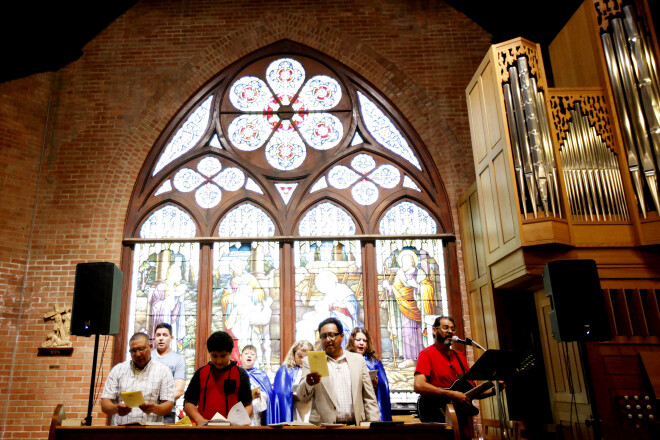Rules of Thumb

There are no laws dictating how the Bible is to be read - if there were, they would be ‘canon,’ the ruler by which we measure other claims, as opposed to the Bible itself! Still, the tradition in its wisdom offers some guidelines, good advice, about how to read, especially when something seems unclear or when one passage seems to conflict with another. Here is a short roster of trustworthy assumptions.
Canon. We have just mentioned this term, which bestows on the Scriptures a unique authority for the Church. It refers also to a list of books which, taken together, may be relied upon to render a faithful and truthful account of truth. This conclusion of the ancient Church was reached over centuries, in council, and throughout the Church catholic. (We can leave aside for now the question of the Apocrypha). Canon does not claim that there are no other truths than those in the Bible. Rather it says that other claims can be judged by whether or not they contradict what the Bible does say. The Bible has nothing to say about astrophysics, but if someone today were to suggest that God did not create the heavens and the earth, they would be in error.
Perspicuity. The Scriptures are clearest about what matters most. In other words, they will make plain to the attentive reader what he or she most needs to know - the creation, our sinful need, Jesus the Savior, the urgency of faith in Him, etc.
Sui interpres(Latin for ‘its’ own interpreter). While one passage may be unclear, it is best elucidated by considering the rest of Scripture, which will serve to put it in context, balance its emphases, clarify its terms, etc.
Inner Testimony of the Holy Spirit. This was simply a way to say that the Bible has the power to make its own case for its truth to the reader. Not only is it clear, but it is compelling! This doesn’t mean that commentary is not helpful. It is saying that through the Bible the One about whom it bears witness actually speaks to the human heart.
Senses of Scripture. What the Bible says is true, but how it is true varies. It may give trustworthy moral direction, or tell us what happened to Jesus, or give us an illuminating vision of how heaven will be. And the Bible can be true in several of these ways at once! The tradition distinguished its trustworthiness in what the words actually say (the plain or literal sense), in what it conveys about Jesus Christ (the typological), how it directs our lives (the tropological), and how it points ahead to the Kingdom of God (the analogical). No need to worry about the technical terms- the main point is that God’s Word is so profound that it is true in several senses at once. Most importantly, when we hear the Gospel it enacts in our souls what it says about Jesus in history.
Scripture is like a river again, broad and deep, shallow enough here for the lamb to go wading, but deep enough there for the elephant to swim.
--Gregory the Great



